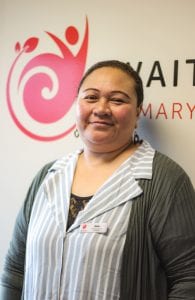Overcoming barriers to health care and connecting those in need with services that can make a difference, are all in a day’s work for Pasifika Navigator Malu Tulia.
Covering an area that stretches from Cheviot to Hinds, the Waitaha Primary Health (WPH) role provides valuable support to a growing Pasifika population, often faced with housing, health and rural challenges. Malu responds to requests from WPH General Practices seeking additional support for Pasifika people and their families. Still in her first year on the job, she estimates she’s reached up to 80 per cent of the local Pasifika population in the Ashburton District.
“I’m really, really happy but I know there are families out there who still need help, so I’m trying to reach those people, too,” Malu says. “In my first year, I have spent time observing and it has given me ideas for new ways of working with people, so that they can better look after their own health. I spent 10 years working in the city where wraparound services are available and everything is closer together, but in rural areas it’s harder, especially when English isn’t your first language.”
When Malu visits families in their own homes, she works with them to create a plan so that they can access services, establish connections and build the general health and wellbeing of their whole whānau. One of the biggest problems she faces is people who are hesitant to visit a doctor because they fear being considered a burden. “They don’t want to waste a doctor’s time,” Malu explains. “In the Islands, we don’t have family doctors: you just go to the hospital when you’re really, really sick. We’re trying to change that behaviour here. We encourage people to see a doctor when they’re well, so that we can prevent major health issues developing.”
Cost can be a barrier but she says it should never stop someone seeing a doctor or nurse because there are always options available. “Another thing is language. Pasifika people may not understand why they’ve been given their medication or what it does. And some people are working two jobs so there’s no time to go to the doctor. I educate people that if you’re sick, go to the doctor, and have a rest. Your body is telling you to look after yourself. I know the money is important but you have to look after yourself before you can earn money.”
To overcome some of the barriers to accessing health advice and support, Malu encourages those she works with to take a support person to appointments, or ask at the medical centre for translation assistance. “Doctors and nurses know there is an interpreter service,” she says. “It’s better for them to use the service and then a patient goes out the door understanding what they have or what they need to take, instead of letting them go with no idea. “
“It’s a matter of educating people that there’s help available, and if you’re not happy with the service, there is a complaint policy. The outcome of that will help you and them to improve services. Don’t come home and say, ‘I’ll never see a doctor again’. If you don’t tell them, they don’t know and can’t change anything.”
During home visits, Malu takes time to include the whole family in the process – especially older children – to discuss everything from food, to smoking cessation and understanding medication. “We provide a plan so people can take care of themselves, but at the end of the day, it’s your health. If you want to make a change, that’s your goal to do, it’s up to you, but we are here to help, support and to walk beside you to achieve those goals.”
Malu is also setting up health support groups around issues such as diabetes and asthma in Pasifika churches; encouraging employers of migrant workers to make health insurance part of their employment packages; and helping to educate people who are new to New Zealand about how to take care of their health and access health services. Creating strong community support is also important and Malu encourages people to get to know their neighbours.
“It’s exactly the same as in the Islands. You ask your next-door neighbour for help. They might be in the same situation some time, so reach out. In rural areas, it’s especially important to have neighbourhoods and build relationships.”
For Malu, the biggest reward is seeing people taking control of their health and developing a wellbeing plan for their whānau. “It makes me feel so happy. I was brought up in the Islands, so I know it’s very daunting to come and live in another country. Sometimes it’s quite scary, so my job is just to be there for them, help and support them, whatever aspirations they have and guide people to lead a happy life.
“I always tell people, you only get one life, you have to look after your health, live happy and spend as much time as you can with your kids and all of your family.”







